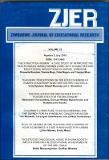| dc.contributor.author | Manwa, L. | |
| dc.contributor.author | Motsi, E. | |
| dc.coverage.spatial | Zimbabwe | en_GB |
| dc.date.accessioned | 2014-11-25T17:54:06Z | |
| dc.date.available | 2014-11-25T17:54:06Z | |
| dc.date.issued | 2010-07 | |
| dc.identifier.citation | Manwa, Lillian & Motsi, Emily (2010) Role Of Gender In The Teaching And Learning Of Home Economics: A Case In Masvingo Peri-Urban, ZJER vol.22, no.2. Harare, Mt. Pleasant: HRRC. | en_GB |
| dc.identifier.issn | 1013-3445 | |
| dc.identifier.uri | https://opendocs.ids.ac.uk/opendocs/handle/20.500.12413/5187 | |
| dc.description | A ZJER article on gender education in Zimbabwe. | en_GB |
| dc.description.abstract | This study sought to find out the role of gender in the teaching and learning of Home Economics in Primary Schools with special reference to one selected primary school in Masvingo Peri-urban - Zimbabwe. A case study was used to get insight into the influence of gender role stereotyping on the development of attitudes towards Home Economics and the effect this has on the support of the teaching and learning of Home Economics. Interviews were the tools used to collect data. Forty parents of pupils from grade six and seven were randomly selected for the study sample. The two female teachers who teach Home, Economics classes and are responsible for the laboratories were also part of the sample. The data was analyzed both quantitatively using percentages and qualitatively to establish emerging themes and reported in a narrative form. The study established that (60%) of parents had negative attitudes towards the teaching and learning of Home Economics that were influenced by gender role stereotyping while (40 %,) had positive liberal attitudes. The provision of resources by the parents was a problem especially among parents with negative attitudes.
Pupils from parents who had a positive attitude were performing well since they had the support and encouragement. The study recommends that the headmasters, teachers and parents hold regular meetings that enable parents to appreciate the importance of Home Economics. Such meetings should be used by the school to create awareness among all the stakeholders on the need to adopt a non gendered approach to role socialization of children. Displays of well made artifacts should be done during open days as a way of emphasizing and highlighting the contribution of the subject to the children’s education. | en_GB |
| dc.language.iso | en | en_GB |
| dc.publisher | Human Resources Research Centre (HRRC); University of Zimbabwe | en_GB |
| dc.rights.uri | http://creativecommons.org/licenses/by-nc-nd/3.0/ | en_GB |
| dc.subject | Education | en_GB |
| dc.subject | Gender | en_GB |
| dc.title | Role Of Gender In The Teaching And Learning Of Home Economics: A Case In Masvingo Peri-Urban | en_GB |
| dc.type | Article | en_GB |
| dc.rights.holder | University of Zimbabwe | en_GB |


